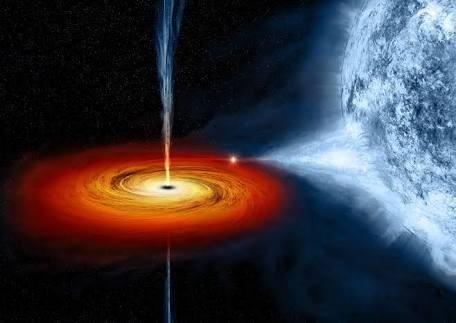** Dear steemit and stemian **- Using the Frederick C. Gillett Gemini Telescope in Mauna Kea, Hawaii, a team of astronomers calculates the mass of the black hole, which is larger than the black hole located in the center of the Milky Way, which is about 4 million solar masses.

Astronomer Karl Gebhardt of the University of Texas, Austin, presented the team's research results on Wednesday, January 12, at the 217th meeting of the American Astronomical Society. He said that the horizon of the black hole, which is 20 billion miles, four times larger than Neptune's orbit and three times larger than the orbit of Pluto. In other words, the black hole can "swallow" the entire system of our solar system.
Previously astronomers have estimated the mass of black holes is about 3 billion solar periods, so their results are somewhat surprising. To calculate the mass of the black hole, astronomers measure how fast the stars around orbit the black hole. They found that, on average, these stars orbit nearly 500 km per second (in comparison, the sun orbits a black hole at the center of the Milky Way galaxy about 220 km per second). From these observations, astronomers can deduce the most accurate estimates of the mass of this massive black hole.
Astronomers consider that the M87 black hole grows to become very large by joining several other black holes. M87 is the largest galaxy in the near universe, and is thought to be formed by the incorporation of approximately 100 smaller galaxies.
Although the black hole is located about 50 million light-years away, it is considered our neighbor in a cosmological perspective. Due to their large size and relative proximity, astronomers consider it the first black hole they can actually "see". So far, no one has ever found evidence of direct observation of black holes. Their existence is inferred from indirect evidence, especially how they affect their surroundings.
More information can be found at http://news.sciencemag.org/sciencenow/2011/01/the-solar-system-swallower.html.
https://phys.org/news/2011-01-astronomers-mass-largest-black-hole.html
Hi! I am a robot. I just upvoted you! I found similar content that readers might be interested in:
https://phys.org/news/2011-01-astronomers-mass-largest-black-hole.html
Downvoting a post can decrease pending rewards and make it less visible. Common reasons:
Submit
@rezafrizayya
Good content
Keep sharing good posts!
Downvoting a post can decrease pending rewards and make it less visible. Common reasons:
Submit